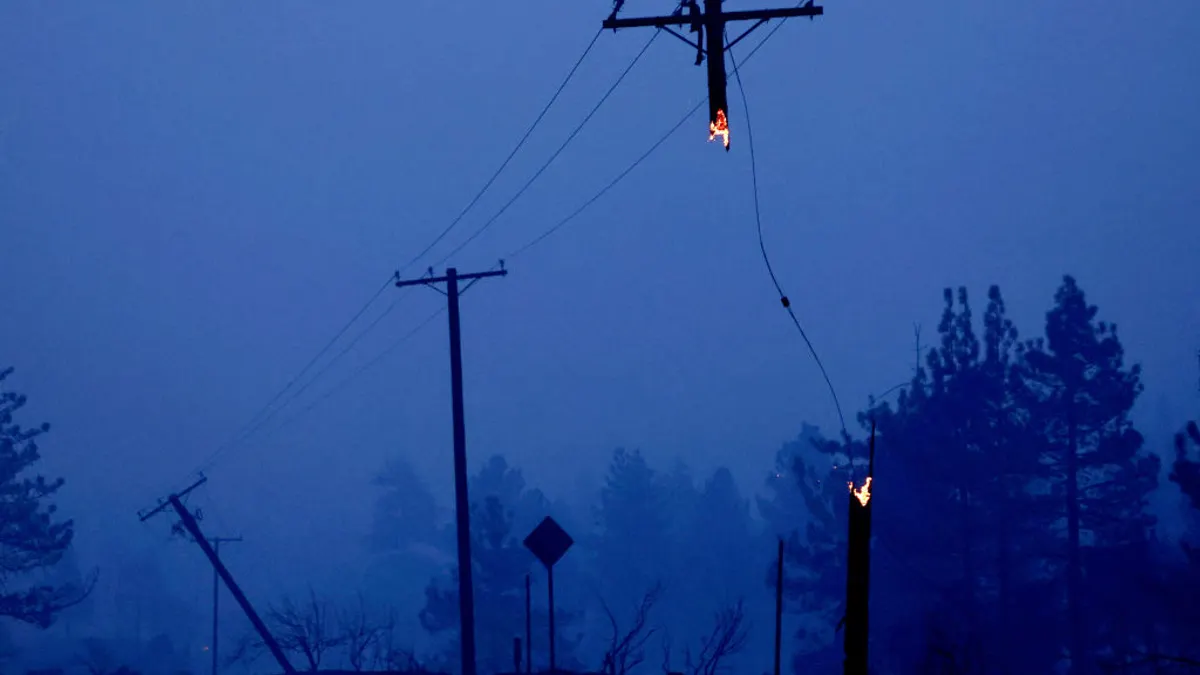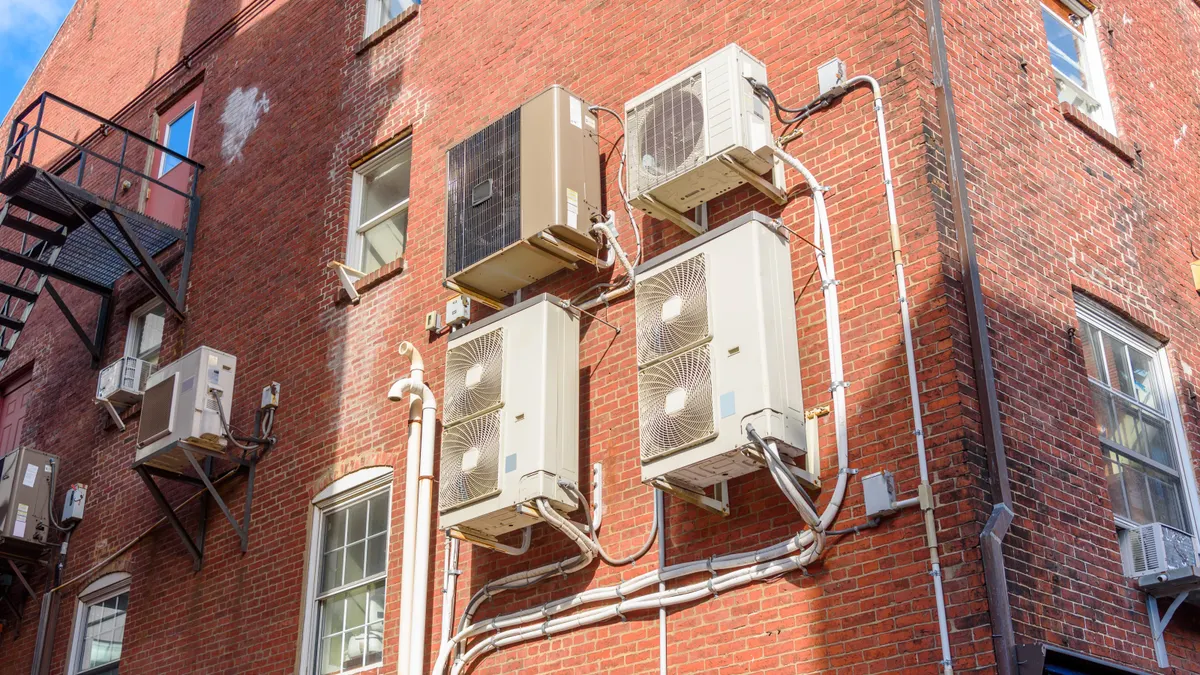Energy regulation often involves layers of complex policy considerations, as many industry leaders can attest.
As midterms approach, analysts predict the House will turn blue, while the Senate is likely to stay red, but energy stakeholders have their own set of representatives running in some tight races on the Democratic ticket this fall.
Utility Dive is tracking four particularly pivotal House races.
"We've been thrilled to see clean energy candidates running all over the country," Holly Burke, Communications Coordinator at the League of Conservation Voters told Utility Dive in an email, listing off four candidates: Mike Levin in California, Sean Casten in Illinois, Dan McCready in North Carolina and Andy Levin in Michigan.
2016 Democratic presidential candidate Hillary Clinton won three of those four districts in 2016, but three of them also held Republican House representatives.
"It's always important to have somebody that has distinct and specific knowledge of how industry operates, what it takes to successfully deliver energy in an efficient and reliable way," Frank Maisano, an energy and environmental media specialist at the Electric Reliability Coordinating Council and principal at Bracewell law firm, told Utility Dive.
"We think candidates with experience in wind and solar energy will bring a much needed new perspective to Congress and will help lead the way as we build America's clean energy future."

Craig Auster
Advocacy partnerships director, League of Conservation Voters
"It's a very complex issue," he said. "How you get from energy in the ground or in the air to people's houses or people's cars is always a very significant road and it's often filled with a lot of difficult decisions, and so anyone that has a specific understanding of that is going to be better off."
Maisano points to Rep. Kevin Cramer, R-N.D., who was formerly a member of the state's Public Service Commission and currently serves on the House Committee on Energy and Commerce.
"He comes to Congress ... and is immediately one of the more significant leaders on the topic because he's just so knowledgeable," said Maisano. "That alone shows how important it is to have specific folks that have that understanding and, you know, ways that they can be influential immediately."
Issues such as climate change often require the knowledge of someone who understands how specific policy, such as a carbon tax, could affect broader facets of the sector, including ratepayers and job growth, said Maisano.
"Looking at that full, broader picture, which many people who have an understanding of the energy industry do, is a much more important piece of having the discussion" around climate change, he said.
"With the recent IPCC report ... it is more important than ever to elect candidates that are committed to reducing carbon pollution," said Craig Auster, advocacy partnerships director with the League of Conservation Voters, in an email. "We think candidates with experience in wind and solar energy will bring a much needed new perspective to Congress and will help lead the way as we build America's clean energy future."
Mike Levin facing Republican Diane Harkey for an open seat in California, 49th District
Levin formerly worked as an attorney focused on environmental law and energy regulatory compliance, and served on the board for the Center for Sustainable Energy in San Diego.
He's running for an open seat in a close district that Clinton won by 7.5 points in 2016 and Republican Rep. Darrell Issa won by half a point. Levin has made climate change the center of his campaign, beginning two years ago when he "sen[t] the nine-term congressman [Issa] a book titled Climate Change for Beginners," noted the Washington Observer.
"If we want the federal government to lead in our transition to sustainable energy, we need people with relevant industry experience," Levin told Utility Dive via email.
"The question is whether Americans will be using clean energy technologies developed and manufactured in Asia and Europe, or whether our federal government will spur clean energy innovation to help America lead in this rapidly-growing industry."
His specific energy policy objectives include a revenue-neutral carbon tax, carbon cap and trade policies, the transfer of San Onofre nuclear plant waste to a secure and permanent location and an end to subsidies for fossil fuel companies. He's endorsed by the environmental groups Sierra Club and California League of Conservation voters.
Sean Casten challenging Rep. Peter Roskam, R-Ill., 6th District
Casten worked as an energy consultant before he became president and CEO of a power plant manufacturer in 2000. Seven years later, he co-founded Recycled Energy Development which converts leftover power plant emissions into electric power.
His energy policy objectives include crafting output based pollution standards, passing a federal fossil fuel-reduction standard, requiring government buildings to follow clean energy standards, establishing national greenhouse gas regulations and eliminating "economically inefficient cross-subsidies that discourage the development of clean energy sources," among other policies.
Casten is running against Republican incumbent Rep. Peter Roskam, who has been in the seat since 2007. District 6 has been labeled as a seat to watch: Clinton took the district by 6.8 points and Roskam, by 18.4 in 2016.
Casten is endorsed by several energy groups and leaders including the former Google director of Climate and Energy, a former deputy administrator of the EPA, a former FERC commissioner, a former majority counsel to the US Senate Committee on Energy and Natural Resources, a former EPA administrator, the League of Conservation Voters, the Sierra Club and the Sustainable Energy and Environment Coalition, among others.
Dan McCready facing Republican Mark Harris in North Carolina's 9th District
In 2013, McCready co-founded Double Time Capital, which invests in utility-scale solar farms in North Carolina and is advised by former Duke Energy CEO Jim Rogers. The company is responsible for 36 solar projects totaling 10% of solar powered electricity in the state, according to a 2017 Forbes article.
His campaign policies surrounding energy focus on creating jobs in the clean energy sector and his website notes he "was a leader in making [North Carolina] second in the US for solar power." McCready is running against Harris who beat out incumbent Republican Robert Pittenger in the primaries.
The district leans heavily toward the Republican vote; President Donald Trump won by 12 points and Pittenger won by 16.4. However, this District is also labeled by local news as a key race that could turn the House blue.
Andy Levin facing Republican Candius Stearns for an open seat in Michigan, District 9
Levin founded Levin Energy Partners in 2011 which works with energy stakeholders to develop energy efficiency and clean energy projects.
The company started Lean & Green Michigan, a finance tool that "helps commercial, industrial, multifamily and nonprofit property owners finance energy efficiency and renewable energy projects." The tool has "facilitated over $20 million in clean energy projects," his campaign website boasts. He advocates for addressing climate change "with tremendous urgency."
Levin is the son of Rep. Sandy Levin, D-Mich., who is stepping down after 35 years in Congress. District 9 leans toward the Democratic vote, with Clinton taking the district by 7.7 points in 2016 and his father taking it by 20.5.






















